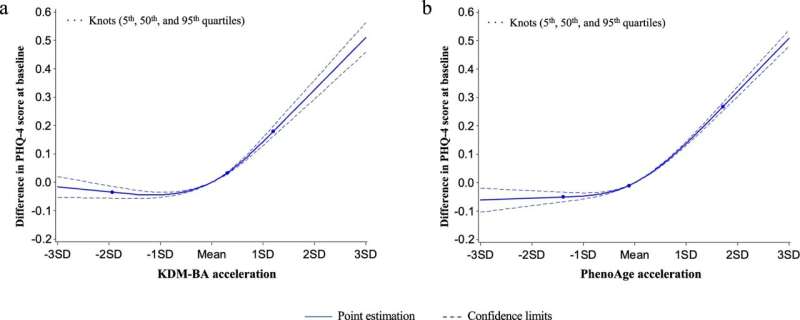This article has been reviewed according to Science X's editorial process and policies. Editors have highlighted the following attributes while ensuring the content's credibility:
fact-checked
peer-reviewed publication
trusted source
proofread
Adults with accelerated biological aging found to be more likely to experience depression and anxiety

A study just released by Columbia Mailman School of Public Health and Peking University School of Public Health provides some of the first, large-scale evidence that processes of biological aging may contribute to risk of depression and anxiety.
Until now nearly all work to date had focused on poor mental health as a risk factor for accelerated aging. A complementary, but less-studied hypothesis is that the reverse process may also occur and accelerated processes of biological aging may, themselves, pose risks to depression/anxiety disorders of older adults. The results are published online in Nature Communications.
The researchers tested associations of blood-chemistry measures of biological aging with prevalent and incident depression and anxiety among a half-million midlife and older adults in the UK Biobank, an ongoing study with 502,536 participants recruited in 2006–2010 at the age of 37–73 years with multiple follow-ups.
The findings showed that adults with more advanced biological age were more likely to experience depression and anxiety at baseline and were at higher risk of depression/anxiety over eight years of follow-up, as compared with peers who were the same chronological age, but who were tested to be biologically younger. At the 8.7 year-follow up mark, participants with older biological age were at a 6 percent increased risk of incident depression and anxiety.
"Among older adults who were free of depression/anxiety at baseline, those whose blood indicated that they were biologically older than their chronological age would predict were more likely to develop depression or anxiety over follow-up compared with those whose blood indicated that they were biologically younger," said Xu Gao, Ph.D., assistant professor at Department of Occupational and Environmental Health Sciences, School of Public Health, Peking University, China, and first author.
Depression and anxiety are common mental disorders that often co-occur and are associated with increased disability and mortality, especially in older adults. Prevention of depression and anxiety in older adults therefore has potential to mitigate disease burden in an aging population. "This study helps confirm that identifying risk factors and mechanisms of vulnerability to mental disorders must be a public health priority, "observed Gao, who had been affiliated with the Columbia Mailman School Department of Environmental Health Sciences .
The research team had released two earlier papers regarding the connections of air pollution with biological aging (Aging Cell 2022) and with mental health (Environmental Health Perspectives 2023), respectively. "These findings complete the logical circle, demonstrating that air pollution may trigger depression/anxiety by accelerating biological aging," said Gao.
The researchers analyzed the UK Biobank data for three overlapping groups of participants with whom Gao and corresponding senior author Daniel Belsky, Ph.D., associate professor of epidemiology at Columbia Mailman School of Public Health, followed up to provide information on their lifestyle and health, and provide biological samples.
The first group included all individuals providing baseline blood chemistry data required for calculation of biological age measurements and who completed mental health surveys at enrollment baseline (N = 424,299). The second group consisted of the subset of the first group who did not have prevalent depression/anxiety at baseline (N = 369,745).
The third group was the subset of individuals who did not have prevalent depression/anxiety at baseline and who also participated in the online follow-up mental health survey, a subset of 124,976 which helped inform the prospective associations between baseline biological aging and the syndromes of depression.
People with incident depression/anxiety experienced higher incidence of chronic conditions over follow-up as compared to those who did not have incident depression/anxiety (for diabetes, 6 percent vs. 3 percent; for cardiovascular diseases, 12 percent vs. 6 percent; and for cancers, 11 percent vs. 8 percent.
The research team notes that while the findings help establish a prospective link connecting older biological age with incident depression/anxiety, they do not address the mechanisms mediating this link, which could be formed at multiple stages in the progression of aging processes.
"We all age at the same rate in chronological terms. But from a biological perspective, some of us age faster than others, developing chronic disease and disability much earlier and living shorter, sicker lives," said Belsky, who is also a member of the Butler Columbia Aging Center at Columbia University. "We now have measurement tools that can quantify differences between chronological and biological age. In this study, we used two of these measurement tools to study the connection between aging and mental health.
"Findings suggest future directions for depression/anxiety risk assessment in older adults as well as the potential for therapies that target the biology of aging to contribute to the prevention of later-life depression/anxiety."
More information: Xu Gao et al, Accelerated biological aging and risk of depression and anxiety: evidence from 424,299 UK Biobank participants, Nature Communications (2023). DOI: 10.1038/s41467-023-38013-7




















